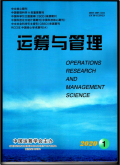运筹与管理2024,Vol.33Issue(5):226-232,7.DOI:10.12005/orms.2024.0171
政府干预下订单农业供应链农户融资模式选择研究
Research on Farmers’Financing Mode Selection in Contract Farming Supply Chain under Government Intervention
摘要
Abstract
The issue of"difficulty with financing"for farmers is a significant bottleneck in the process of moderni-zation of agriculture in China,directly related to the sustainable development of agriculture and increase in farm-ers’income.To address this challenge,the Chinese government has implemented a variety of policies to facili-tate smooth financing for farmers,among which the agricultural loan risk compensation policy is a notable exam-ple.This risk compensation policy has effectively lowered the financing threshold for farmers,providing them with initial funding for the cultivation of agricultural products.Consequently,it has been beneficial to enhancing the income of farmers.However,in agricultural supply chain finance,there are two main financing models,trade credit financing and bank credit financing,presenting farmers with the dilemma of choosing a financing model.The formulation of government policies also needs to consider the performance of policies under different financing models.Therefore,this paper focuses on exploring the following questions:(1)What is the impact of different financing models on the output of agricultural products?(2)Under government risk compensation poli-cies,which financing model should farmers choose to optimize their income?(3)How does social welfare change under different financing models,and how can both farmers and the government achieve a win-win situation? To address the above problem,this paper constructs a government-intervention"company+farmer"type order agriculture supply chain financing model based on the characteristics of government risk compensation and the stochastic output of agricultural products,analyzes and compares the impacts of bank credit financing and trade credit financing on farmers’production decisions and social welfare. The managerial implications of this paper include:(1)Under different financing models,the impact of government risk compensation policies on farmers’expansion of planting scale varies.In trade credit financing,government guarantees can reduce corporate borrowing risks,and encourage enterprises to increase their purchase prices and quantities of agricultural products.However,in the bank credit model,while government guarantees also reduce the borrowing risk for banks and lower loan interest rates,this may lead to a decrease in contract pur-chase prices.Nonetheless,the lower loan rates reduce the production costs for farmers,facilitating an expansion in planting scale.(2)Banks’risk aversion leads to higher loan interest rates and purchase prices,increasing the planting costs for farmers,which might suppress the expansion of planting scale.Compared to trade credit,bank credit can better help farmers transfer risk and expand their planting scale when output risk is higher.(3)Governments with ample budgets should prioritize promoting bank credit to increase farmers’income and social welfare.Under smaller guarantee intensities and lower risks,the government should guide farmers to choose the appropriate financing model based on the size of output risk and provide accurate meteorological infor-mation to support decision-making. Future research plans will delve into the specific impact of the initial capital size on farmers’production decisions,and analyze how different levels of initial capital affect the determination of agricultural production scale and government decision-making behavior.Furthermore,considering that farmers’attitudes towards risk significantly influence their production behavior during the decision-making process,future research will also incorporate farmers’risk aversion into the analytical framework of the model.关键词
供应链金融/订单农业/政府风险补偿金/融资模式选择Key words
supply chain finance/contract farming/government risk compensation/financing model selection分类
管理科学引用本文复制引用
蔡子功,叶飞,梁伦海,谢泽飞..政府干预下订单农业供应链农户融资模式选择研究[J].运筹与管理,2024,33(5):226-232,7.基金项目
国家社会科学基金重大项目(22&ZD082) (22&ZD082)

